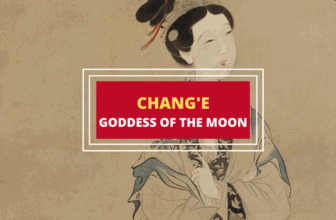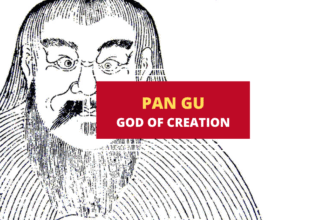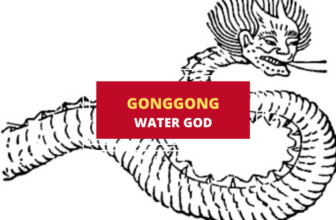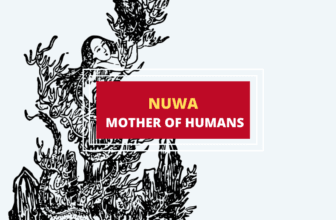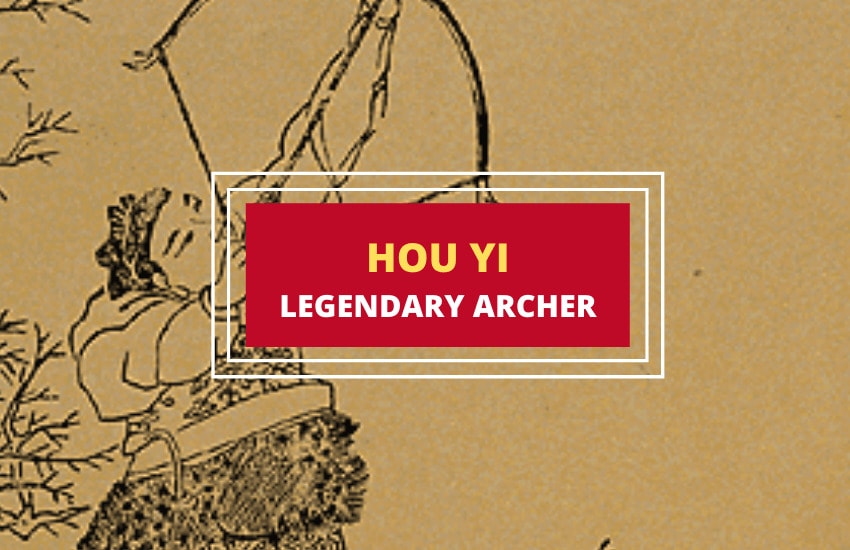
Table of Contents
Hou Yi is an intriguing character in Chinese mythology, portrayed simultaneously as a hero and a tyrant, a god and a mortal man. There are contradictory myths about this legendary archer, but the most famous involve his relationship to the goddess of the moon, and saving the world from an excessive number of suns.
Who is Hou Yi?
Also known as Hou I, Shen Yi, or just Yi, Hou Yi is given the title of “Lord Archer” in most of his myths. He is one of the most famous heroes of Chinese mythology to the point where different Chinese regions and peoples having varying stories about him. Hou Yi’s name literally translates as Monarch Yi which is why many view Yi as his only actual name.
In some myths, Hou Yi is a god who descended from the heavens, while in others he’s portrayed as a demi-god or a fully mortal man. The latter myths do seem to take precedence as there are several similar stories of him gaining (or trying to gain) immortality.
Hou Yi is also famously married to Chang’e the Chinese Moon Goddess. In some myths, they are both gods that come down to Earth to help people, and in others they are mere mortals who eventually ascend into godhood. In almost all versions, however, their love is described as powerful and pure.
Hou Yi vs. The Ten Suns
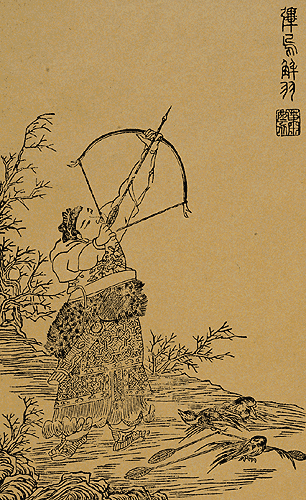
One curious tidbit about some Chinese myths is the fact that there were originally ten suns in the sky. However, not all Chinese myths support this idea. For example, the Pan Gu creation myth says that the moon and the (only) sun came from the two eyes of the giant Pan Gu. In all myths pertaining to Hou Yi, however, there were originally ten suns in the sky.
What stopped the Earth from being engulfed in flames was the fact that the ten suns took turns coming into the sky each day. It was believed, however, that one day all ten suns would appear on a single day and would scorch everything beneath them.
To stop this from happening, the mythical Emperor Lao tasked Hou Yi to “rein in the suns”. In some myths, Hou Yi was a mortal man who was just entrusted with this task and in others, he’s described as being a deity himself, who was sent down from the heavens to perform this feat.
In either case, the first thing Hou Yi tried was to talk with the suns and to persuade them to never come out at the same time. However, the ten suns ignored him, so Hou Yi tried intimidating them with his bow. When it became clear that the suns wouldn’t heed his warning, Hou Yi started shooting them down one by one.
Every time Hou Yi shot a sun, it would turn into a three-legged raven, also known as a Golden Crow. With nine suns down and one to go, Emperor Lao told Hou Yi to stop as the land needed at least one sun in the sky to survive.
In some myths, it wasn’t just Emperor Lao who pleaded with Hou Yi but also the solar goddess Xihe – the mother of the ten suns. In other myths, neither Xihe nor Emperor Lao managed to persuade Hou Yi to stop, so they had to steal his last arrow instead.
A Slayer of Monsters
Hou Yi didn’t specialize in shooting down celestial bodies exclusively. After seeing his amazing proficiency with the bow and arrow, Emperor Lao also tasked him with ridding the land of some of its most menacing monsters. These include:
- Yayu – Initially a benevolent supernatural creature, Yayu was (first) killed by Wei, one of the 28 Constellation Mansions/Gods of Chinese mythology. After its death, the creature was resurrected by heaven into a nightmarish and man-eating beast that Hou Yi had to kill.
- Dafeng – A monstrous, giant bird, Dafeng’s name literally translates as “strong wind”. However, this didn’t save the creature from Hou Yi’s arrows.
- Jiuying – Supposedly the deadliest creature in all of Chinese mythology, according to the ancient Huainanzi texts, even Jiuying was no match for Hou Yi’s arrows. The beast had nine heads, and “was a creature of both fire and water”. Its wails were like those of a crying baby (which, presumably, was meant to be terrifying).
- Xiuchen – Similar to the legendary giant python Bashe, Xiuchen was an enormous snake capable of devouring whole elephants. It’s said to have dwelled in the Dongting Lake in the Hunan Province and its name translates as “adorned snake” or just “long snake”. It’s hard to imagine how many arrows were needed to fall such a monstrosity but nonetheless, Hou Yi managed that feat.
- Zaochi – This humanoid monster had a pair of buckteeth that were strong enough to smash anything in the world. Zaochi also carried a mighty melee weapon but Hou Yi stalked him from afar and shot him with his magic arrows, ending the threat with ease.
- Fengxi – Hou Yi encountered this cattle-eating monstrosity after he had run out of his magic arrows. He was forced to use ordinary arrows to kill the beast but those only scratched Fengxi’s impenetrable skin and barely woke him from his sleep. In his ingenuity, Hou Yi remembered that bamboo sticks can explode when burnt. So, he gathered several bamboo tubes, buried them around the monster, and lit them up from a distance, killing Fengxi almost instantly.
The Gift of Immortality
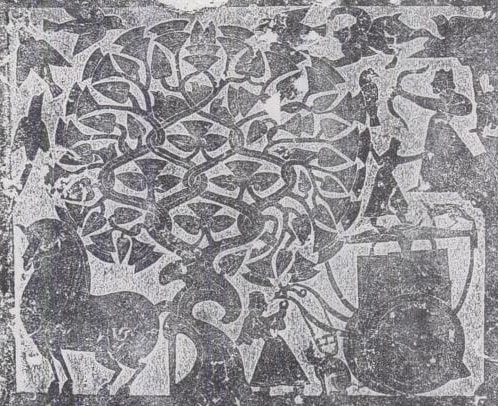
Some myths portray Hou Yi as an immortal god right from the get-go but many others tell of how the gods attempted to give him immortality as a reward for his heroic actions. In almost all those myths, he never benefited from this gift.
According to one myth, the gods give Hou Yi immortality in the form of a pill that had to be swallowed. However, before Hou Yi had taken the pill, his apprentice Peng Meng broke into his home and tried to take the pill for himself. To stop him, Hou Yi’s wife, the Chinese Goddess of the Moon, Chang’e swallowed the pill instead. After doing so, Chang’e ascended to the moon and became a goddess.
In other myths, the gift of immortality came in the form of an elixir. It was given to Hou Yi by Xiwagmu, the Queen Mother of the West. However, in this version of the myth, Hou Yi had proclaimed himself as a hero-king of the land after shooting down the nine suns and had become a cruel tyrant to his people.
Because of that Chang’e feared that if he became immortal, he would torment the people of China forever. So, she drank the elixir instead and rose to the moon. Hou Yi attempted to shoot her down the same way he had shot the nine suns but he missed. The Chinese Mid-Autumn Festival is celebrated in honor of Chang’e’s sacrifice.
Symbols and Symbolism of Hou Yi
Hou Yi is an iconic and multifaceted character in Chinese mythology. He is both a savior of China and the world, as well as a tyrant who wanted to live and rule forever. He isn’t remembered negatively, however, but rather as a morally grey and “realistic” character (putting the magic arrows and monsters aside).
All in all, his main symbolism seems to be that of a patron to Chinese archers. In the myths that view Hou Yi in an entirely positive light, his love with Chang’e is also put on a pedestal as one of the greatest love stories in all of Chinese mythology.
Importance of Hou Yi in Modern Culture
Hou Yi’s character is pivotal for Chinese mythology, but he isn’t seen too often in fiction and pop culture outside of the country.
A recent and notable exception is the Over the Moon 2020 animated movie by Pearl Studios that aired on Netflix. There’s also the Chinese drama series Moon Fairy and quite a few other Chinese songs, dances, and plays. Hou Yi is also a playable character in the famous MOBA video game SMITE.
Apart from this, the story of Hou Yi and Chang’e has been adapted into songs, plays, tv serials, and even movies.
Wrapping Up
Hou Yi is an ambiguous character in Chinese mythology. He is best known as the husband of Chang’e and for saving the world by shooting down the ten suns.




